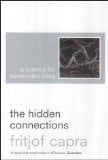 The Hidden Connections: A Science for Sustainable Living
The Hidden Connections: A Science for Sustainable Living
by Fritjof Capra
Flamingo, £8.99, ISBN 000655158 0
Fritjof Capra is a physicist who has produced a series of popular books, starting with The Tao of Physics in 1975, and moving into biology and ecology. In this book, Capra is trying to outline a grand theory of life, the mind, society and the material world using complexity theory (or, as he often calls it, ‘nonlinear dynamics’).
The first third of the book is a summary of the science and social science needed for Capra’s vision. Although Capra keeps the explanations non-technical, it is fairly indigestible, using many new terms such as ‘autopoiesis’ and ‘neuropheonomenology’. Throughout, the key idea is that new understandings of the real world must involve complex networks with non-linear dynamic linkages.
In the latter part of the book, Capra tries to apply his ideas to the world at large. We learn that the bosses of giant corporations are deeply troubled, that global capitalism is creating much poverty and destroying the environment, that modern genetic engineering is extremely dangerous, and that environmentalists are trying hard to find alternatives. In his final chapter ‘Changing the Game’ he spells out what an environmentally sound world might look like. Capra’s vision is impressive, but the book has several problems. The arguments in the second part really do not follow from the science in the first: occasionally throwing in references to networks and nonlinear dynamics does not help much. Further, much of the science in the first part is speculative: it might turn out to be right, but it might lead nowhere. Finally, Capra is spelling out his own vision, and so alternative viewpoints and criticisms receive little attention.


